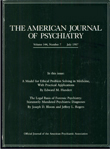Psychopathology: The Evolving Science of Mental Disorder
This edited volume, which honors the long and productive research career of Dr. Philip Holzman, is divided into four major sections reflecting the major areas of Dr. Holzman's research: Brain Mechanisms, Development, Thinking, and Genetics.
Much in this book is praiseworthy. Particularly good are the contributions of Dr. Holzman himself. He has written short “commentaries” on a number of chapters, and his remarks range from methodological insights to whimsical historical reflections, including a wonderful quote from Freud on the problems of self-knowledge. In addition, Holzman provides a more lengthy and integrative final chapter in which he reflects, in a particularly thoughtful manner, on developments in the science of psychology since he entered the field in 1946. An example of his pithy prose is his critique of the contribution of psychoanalysis during its heyday in the 1940s and 1950s: “In this area we knew little and presumed much” (p. 585). He argues eloquently for both the need for and the dangers of integrative meta-theories in psychology and psychiatry.
The editors, all Harvard faculty, have assembled a distinguished list of contributors—24 in all. There are too many chapters to comment on them individually. High points for me included 1) a clear and thorough review of temporal lobe structural abnormalities in schizophrenia by Martha Shenton, 2) a cautionary tale on the problems of cerebral localization by Deborah Levy, 3) a thoughtful and integrative chapter by L. Erlenmeyer-Kimling on developmental models of schizophrenia, 4) an incisive review by Dante Cicchetti of models of development and interplay between the study of the normal and the abnormal, 5) useful overviews by Jerome Kagan and by Jean and Loren Chapman, respectively, of their research into developmental aspects of human temperament and self-report indexes of proneness to psychosis, 6) an elegant presentation by Allan Mirsky of his model of attention, which has produced strikingly congruent findings in probands with schizophrenia, their relatives, and control subjects in Israel,Ireland, and Washington, D.C., 7) a particularly lucid introduction by Kenneth Kidd to the problems of gene detection in complex disorders like schizophrenia, and 8) a creatively iconoclastic final chapter by Steven Matthysse in which he draws parallels between abnormal central nervous system development in schizophrenia and the development of the eye of the drosophila.
This volume does not escape entirely the common limitations of edited works, however. The individual contributions differ widely in orientation and complexity. Although repetition is not so much a problem, readers seeking an integrated overview of these major fields of research are likely to be disappointed. Those without substantial background in the area may have some difficulty in integrating the individual chapters into a more coherent whole. To put it another way, the editors have presented us with a smorgasbord rather than a well-coordinated banquet. The rapid march of science can also have an adverse effect on the relevance of these edited volumes, which often take years to reach their readers. For example, the value of the excellent chapter by Kidd is unfortunately diminished by the absence of reference to developments in this field after 1994.
This volume should appeal to those interested in a selective overview of a range of research areas in psychopathology. Some (perhaps most) readers will choose to read only the chapters that most interest them. However, those who persevere and read the entire volume will be rewarded both with a sense of perspective on the breadth and depth of current research in psychopathology and with the feeling of having participated in a joyful and well-earned celebration of the career of Philip Holzman.



